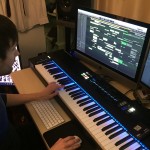We’re back with another “Blast to the Past” interview where we’re spotlighting classic interviews that I conducted while writing for Music4Games. Since the website is no longer online, I thought it would be a shame to let these interviews slide into the void, so we’ve decided to give them new life here on OSV.
With Super Mario Galaxy 2 on the horizon, we thought it’d be appropriate to take a trip back to the release date of the original Super Mario Galaxy to see what Nintendo’s Koji Kondo and Mahito Yokota had to say about the game’s music. I hope we can get a repeat of this kind of interview for Super Mario Galaxy 2, but in the meantime, read what the two have to say about their inspirations, recording with a live orchestra, and about the soundtrack release that they skirted around and then went on to announce a full two weeks later (yes, I’m still bitter).
Good times. Check out this piece of history after the jump.
Jayson: It has been over twenty years since your music in Super Mario Bros. captivated gamers around the world. Here we are now, looking at the release of Super Mario Galaxy on the Wii in November. How would you describe the changes you’ve seen over the last twenty years, and has it been hard to adapt to the constantly changing technology?
Koji Kondo: It has been 22 years since Super Mario Bros. was released. Game music creation has been changing due to the improvement in quality of hardware and software technology. For this title, Super Mario Galaxy, we have also created orchestrated music. Although 22 years have passed and hardware has improved, our goal to develop game music has always been the same; that is we create sound that allows people to have more fun playing the game. We made orchestrated music this time because we wanted players to feel the magnificence of the universe in the game, and we also incorporated various ideas of interactive sounds that vary based on the situations of the game play.
Jayson: You mentioned during the GDC 2007 Audio Track keynote that your approach to composition takes into consideration three elements: rhythm, balance, and interactivity. In terms of rhythm, have you found it difficult to stay true to this element given the complex controllers and control schemes that have been developed over the years? How would you describe the implementation of rhythm in Mario Galaxy’s score given its motion-sensing control scheme?
Mahito Yokota: In the game, there is a mode called ball rolling. It is just like balancing yourself on a ball as they perform in circuses. When you tilt your Wii Remote, the speed of rolling is changed depending on the angle you tilt the Wii Remote. Synchronized with the speed, tempo and tone interval of the music is smoothly changed. You can enjoy non stepped and smooth change in rhythm in concert with non stepped movement of the Wii Remote with motion sensor.
Besides that, there is a feature that some simple melodies synchronized with orchestrated music are automatically generated at the various scenes in the game (for example, when you get Star Rings, or when coins appear after you beat the enemies, etc.). Game music and rhythm and melody of sound effects are interactively connected, which must be unique things only game music and sounds can realize.
Jayson: Video footage has been released showing an orchestra recording session for Super Mario Galaxy. How much of the score is being orchestrated? The music itself sounds like it’s from a Zelda game given its epic approach. Was this your aim with the score for Super Mario Galaxy?
Yokota: 28 tunes have been orchestrated, including the ones performed by smaller sized orchestras. We were not especially conscious of Zelda, but we were making music in order to make them match well with game tempo of Mario Galaxy and image that people explore the magnificent universe. I think you will notice when you play the game that tempo is very much constant, although rhythm of the music may be epic, because we prepared orchestrated tunes that will well suit tempo of the game play. On the other hand, when we create synthesizer music, we were looking toward melodious music for the orchestrated score, while we were putting emphasis on the atmosphere.
Kondo: We created an orchestra score this time, because we wanted to express magnificence of the universe and cool ambiance. We created game music that matches with the game universe, which brought about totally different taste compared with the tropical image of previous Mario music.
Jayson: Can you describe the tools being used to compose the score for Super Mario Galaxy? For the orchestral pieces, are you creating mock-ups and working closely with arrangers? How has the fact that the game takes place in space played into the creation of music for Super Mario Galaxy, and has Kondo-san’s work on the Star Fox series (which also takes place in space) helped at all?
Yokota: Composition tools are the ones ordinarily sold in the market. And these are almost the same as ones that professional composers often use. Since I was in charge of orchestration, I was arranging the music into orchestrated ones using MIDI data of the music that Mr. Kondo provided me.
Kondo: I worked hard in order to not make the music like Star Fox, rather than trying to leverage upon an experience of working on the Star Fox sound.
Jayson: In a past interview with Yamamoto-san, he said that both you and he are responsible for music direction on many Nintendo titles. Can you take us through your role on various projects? When it comes to a main Mario or Zelda title, you obviously take on a more hands-on approach as far as composition is concerned, but how involved are you typically with spin-off entries like The Legend of Zelda: Phantom Hourglass and Super Paper Mario?
Kondo: I was involved in titles such as The Legend of Zelda: Phantom Hourglass and Super Paper Mario as the supervisor.
Jayson: Approximately how many minutes music will be featured in Super Mario Galaxy? What went into the decision to have Kondo-san write only four pieces for the game? Are you acting mainly as a music director for this massive title while simultaneously working on many other projects?
Yokota: The volume of the music is just as much as 2 music CDs, having approximately 100 tunes. Basically I was asked to be fully in charge of music creation for the game, so I was making an effort to create music as much as possible. I asked Mr. Kondo to create music for the scenes that we wanted to have a totally different taste of music.
Kondo: Yes. Although I have been involved in various other projects, my roll in the Mario Galaxy was challenging since these 4 tunes were important ones.
Jayson: You have been more visible in recent years, including many concert appearances both in the United States and Japan as well as your recent trip to the previously mentioned Game Developer’s Conference. Describe your experience both performing Mario music live and meeting your thousands of fans in the United States.
Kondo: I was surprised by the excitement at the concert held in the US. I was moved to find there are so many people who enthusiastically love game music. I was truly pleased to share the excitement there because I could directly see the users, whom I would have never met if I had only been creating music in the company. During the autograph session, many people encouraged me, which energized me. I am very grateful for that.
Jayson: You’ve said that your favorite music you’ve written is from the original Super Mario Bros. Has the popularity of your music around the world changed you as a person, and has the fact that people listen to your music outside of the gaming experience changed how you approach writing music?
Kondo: I am very much pleased to see there are still so many people who love music that I composed no less than 22 years ago. However, the music cannot be created and cannot be famous worldwide without the Super Mario game, and this is the music created in order for people to enjoy the game more. So, I am grateful to the staff who created the game and Nintendo.
Jayson: Given the time and money that’s going into orchestrating and recording pieces for the score for Super Mario Galaxy (and the recent The Legend of Zelda: Twilight Princess), why have there not been soundtrack albums released for these titles? Are there any plans to distribute soundtracks for these titles in the future? iTunes would be a great alternative to a traditional CD release. There are thousands of fans who want to listen to your music outside of the gaming experience.
Yokota: I am very happy that many people give us favorable opinions of Mario Galaxy game music. We are contemplating the possibilities of having a soundtrack album, since there have been soundtrack albums for Nintendo games released in the past.
Jayson: Are you at liberty to tell us what you will be working on next? While it is understood that you will be overseeing a large amount of Nintendo titles, will you be composing new music yourself any time soon?
Yokota: I cannot talk about the next project. However, I can say that I want to continue to make use of orchestrated music especially for the creation of game music.
Kondo: Of course, I want to make music loved by people so that we can make our games more exciting. And also, I want to incorporate many ideas of interactive sounds in the games.
Tags: A Blast From The Past, Features, Interviews, Koji Kondo, Mahito Yokota, Music4Games, Nintendo, Super Mario Galaxy, Videogame, Wii








































